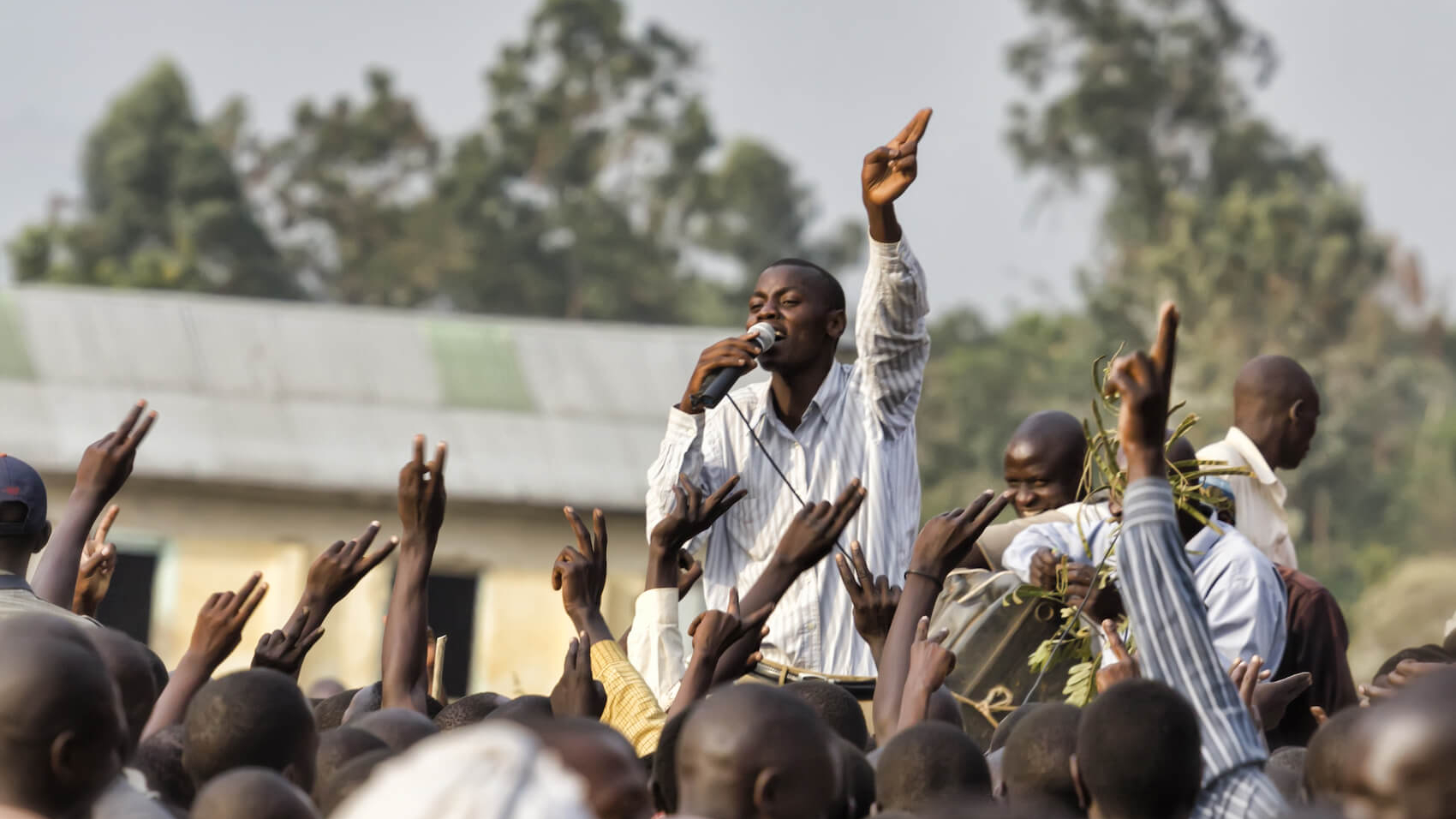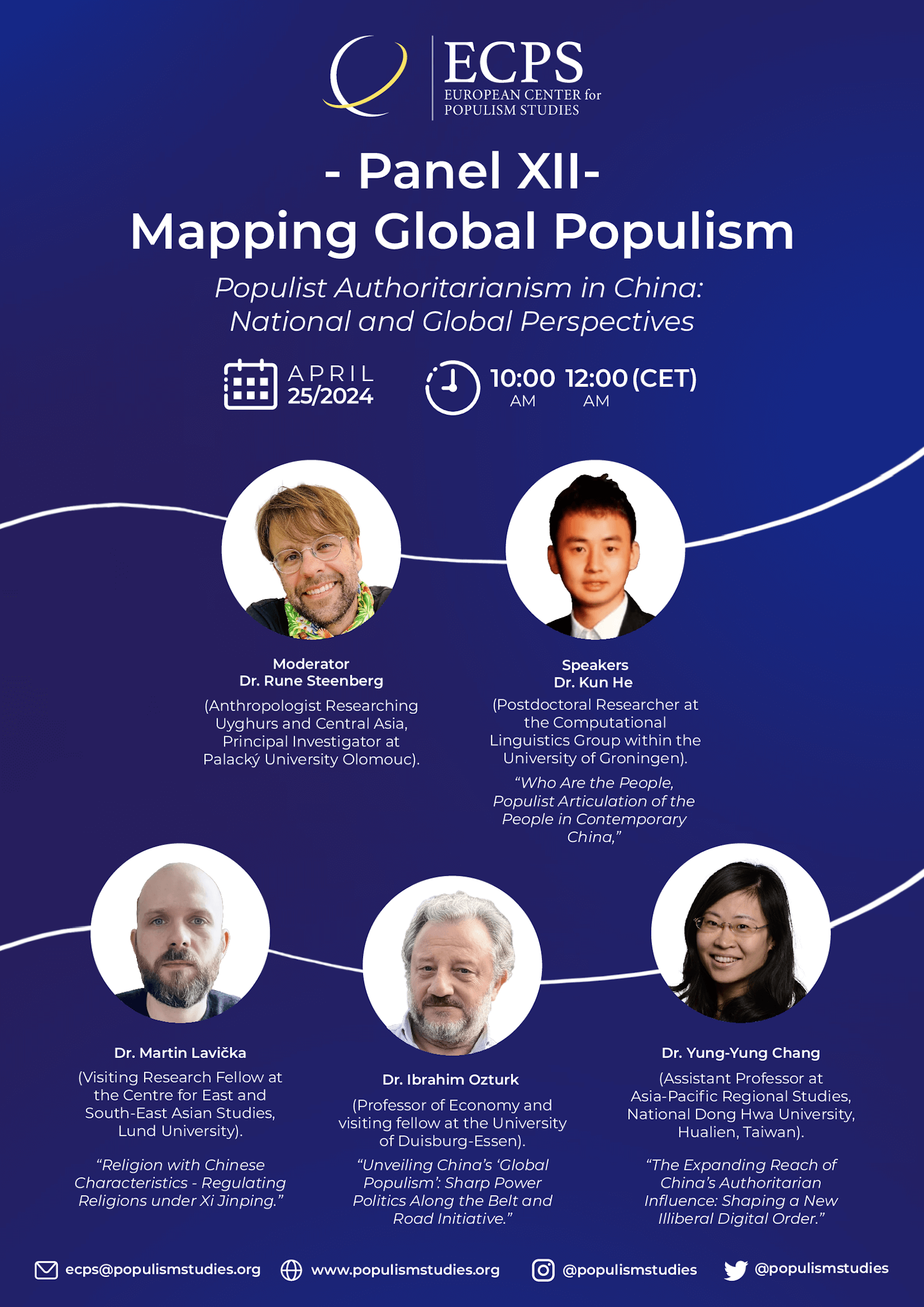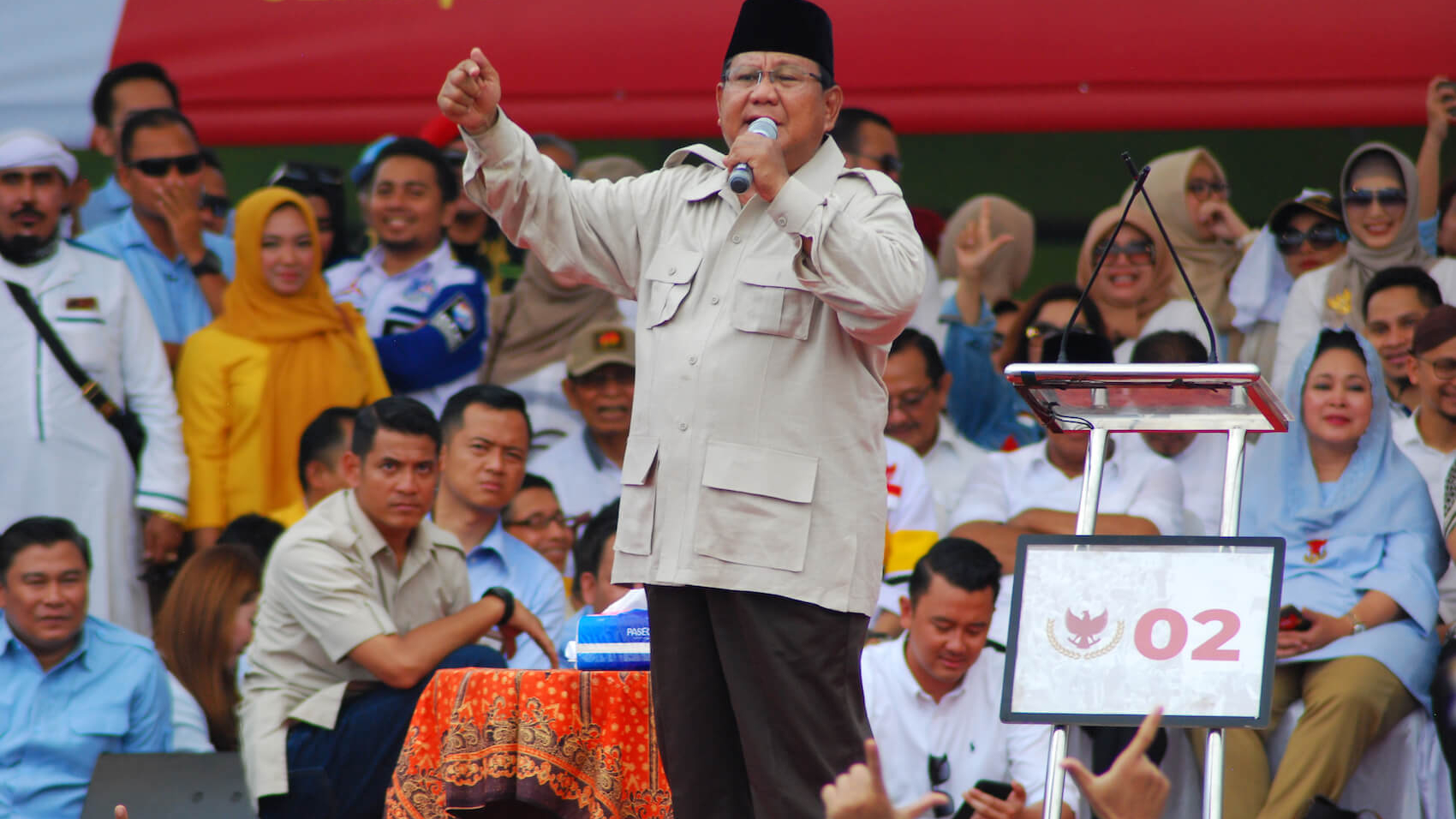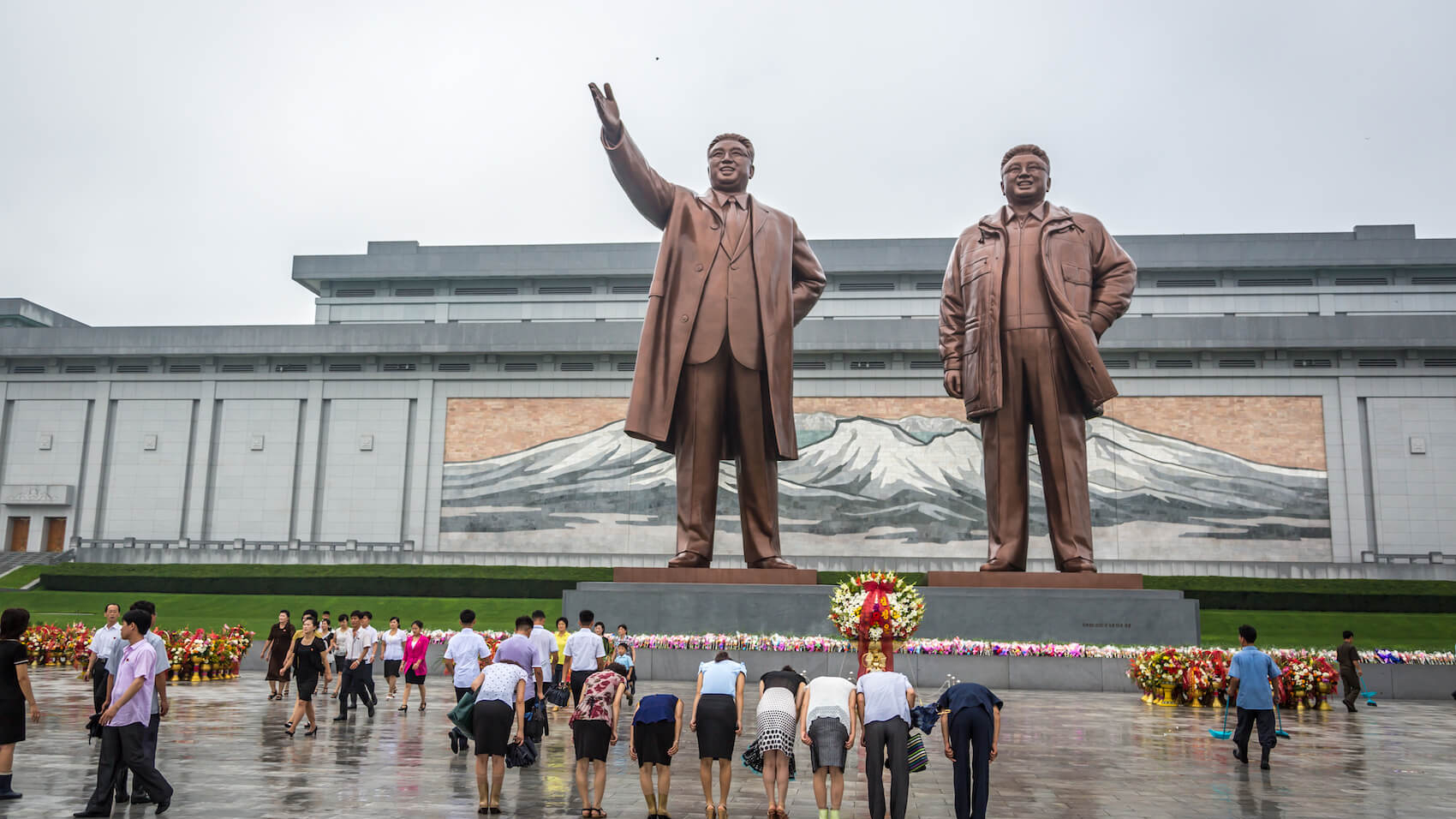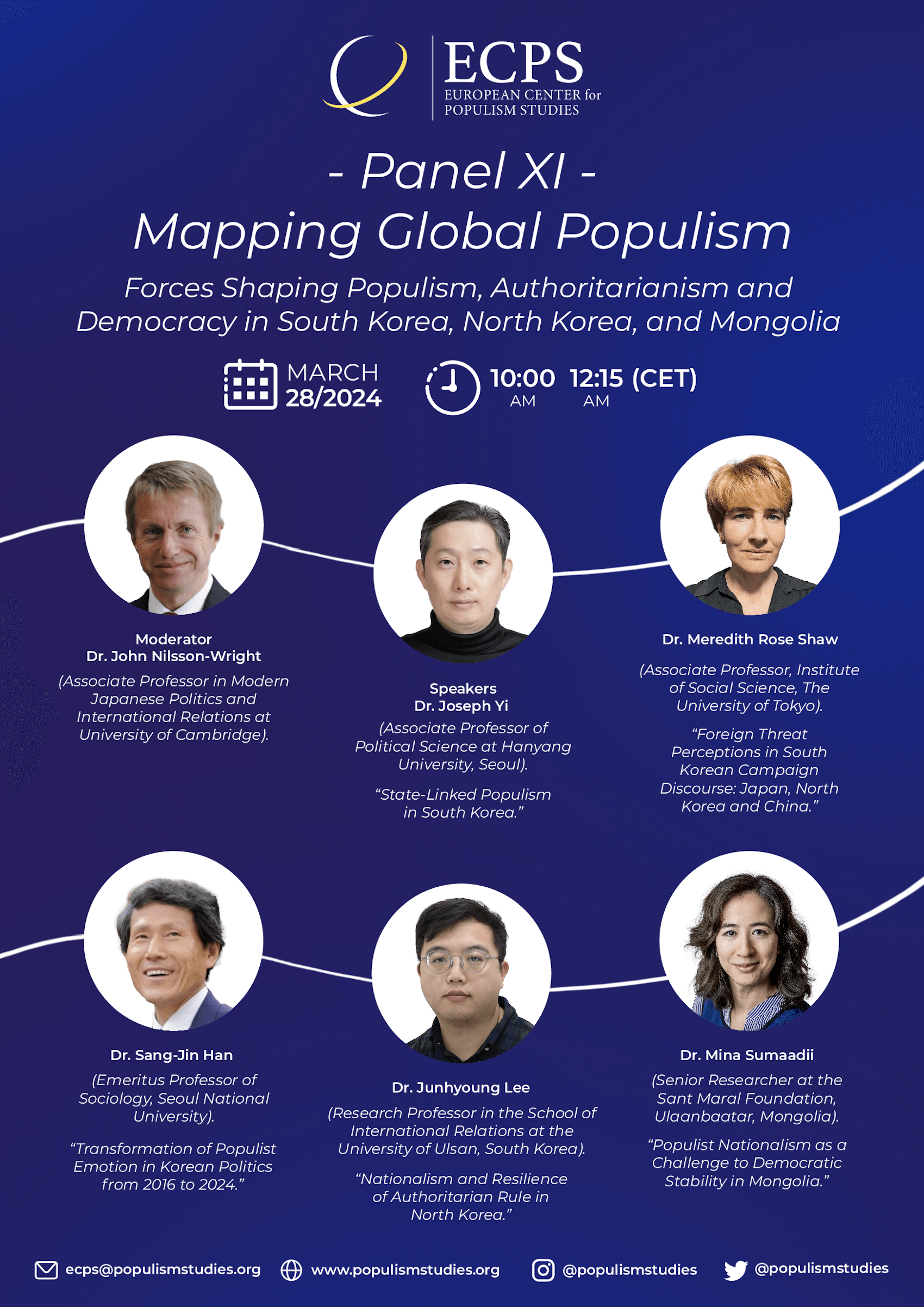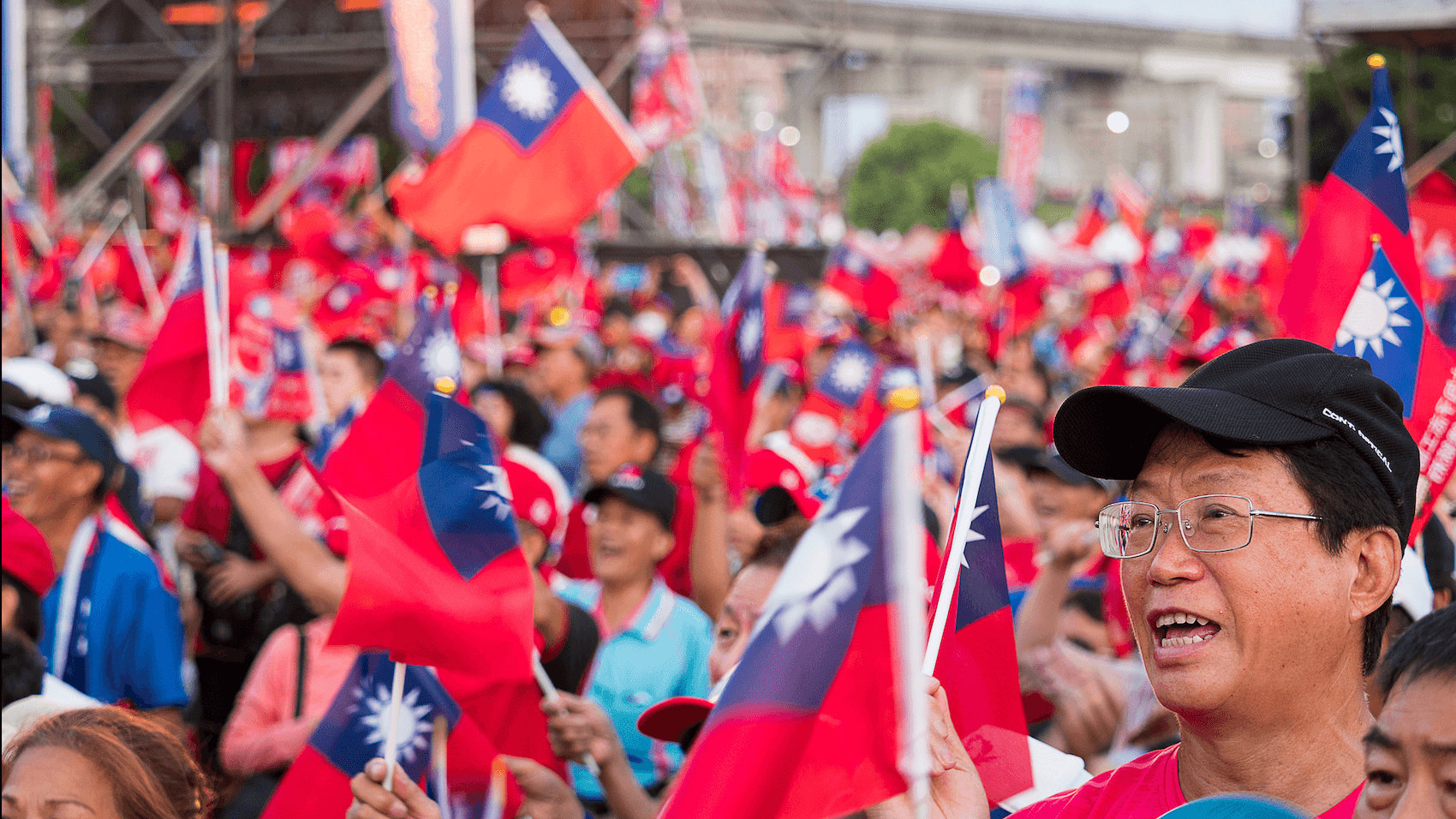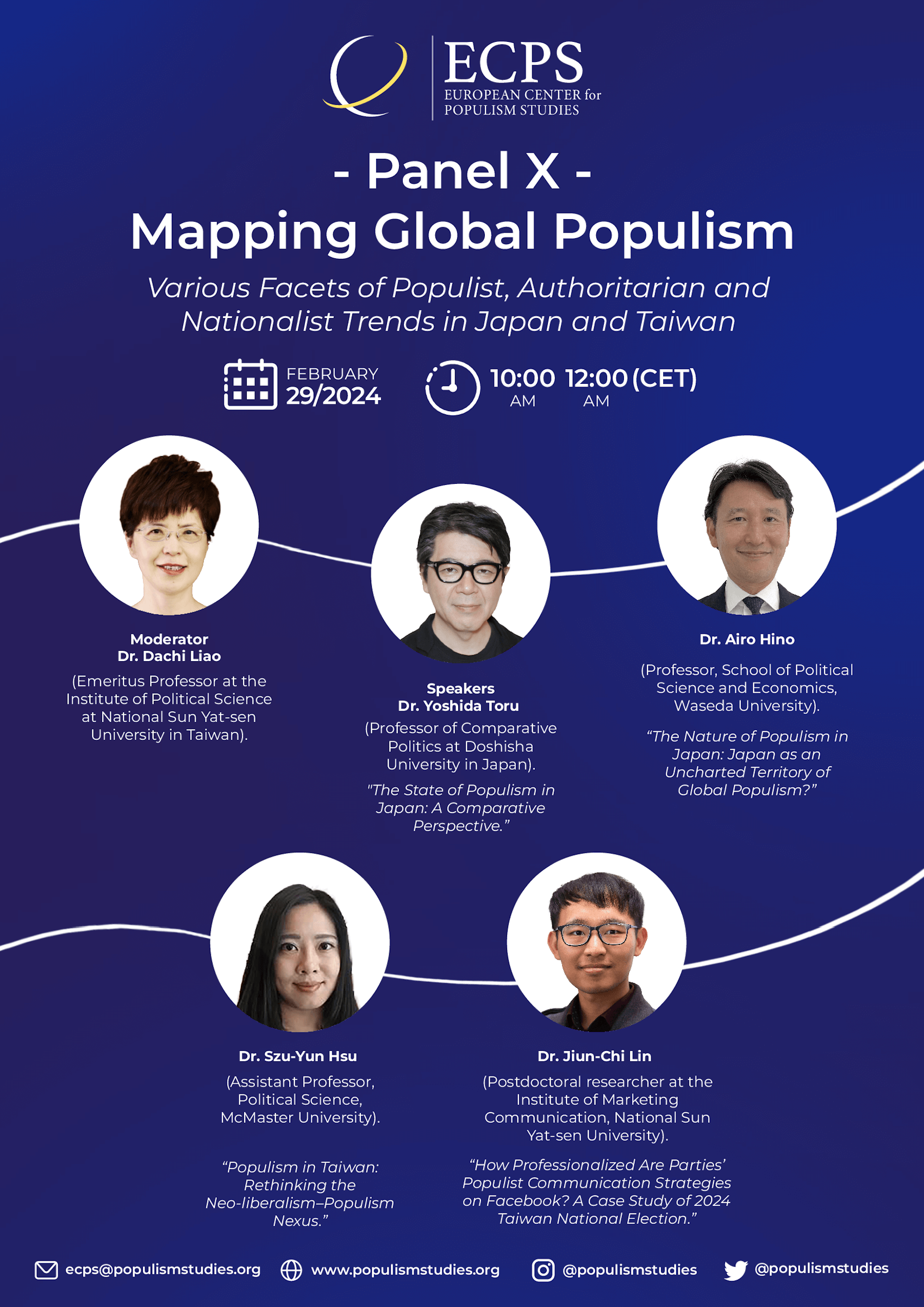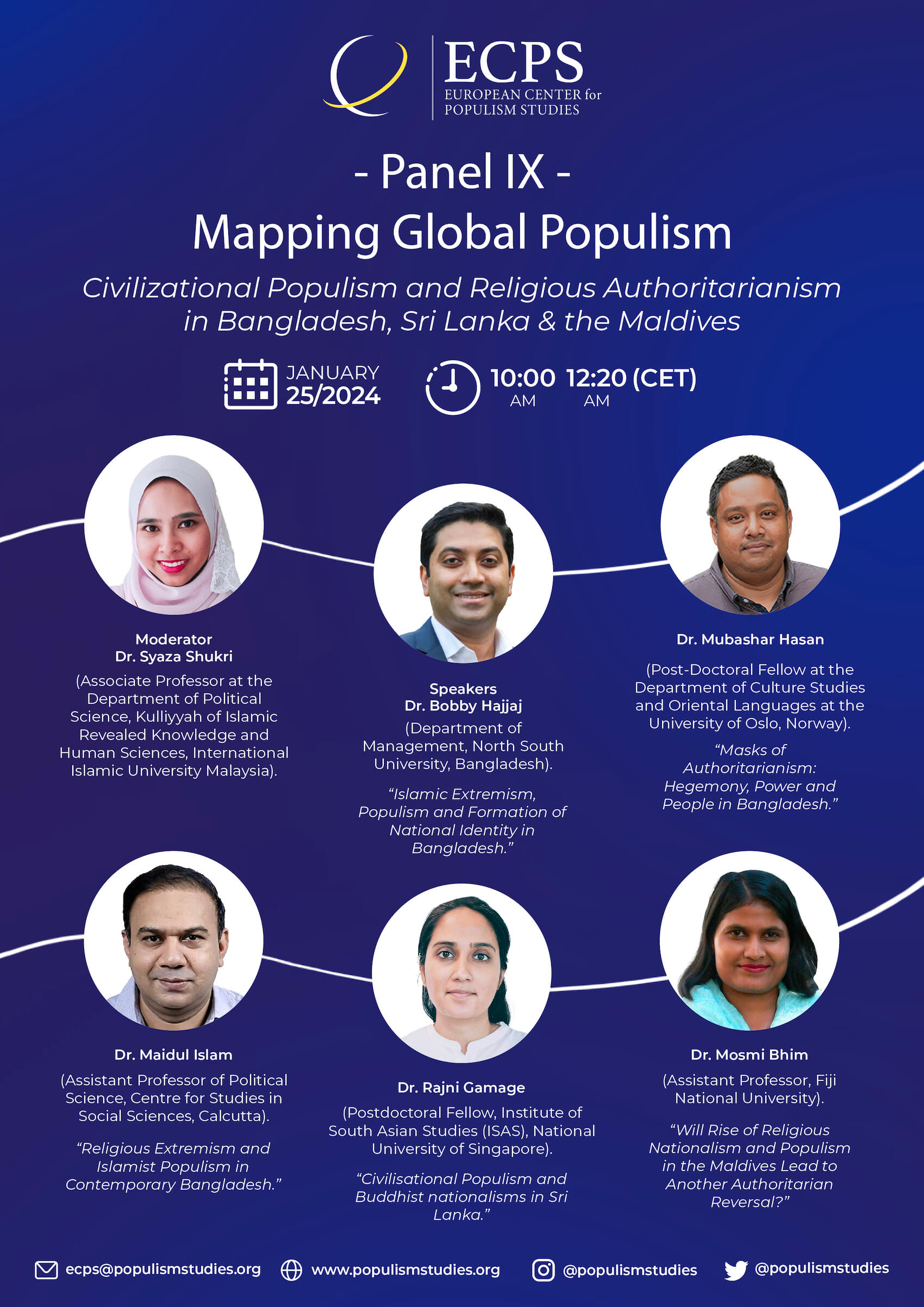Virtual Symposium by European Center for Populism Studies (ECPS), Brussels/Belgium.
March 19-20, 2024
Day I (March 19, 2024)
13:00–17:00 (Central European Time)
Opening Speech
Irina VON WIESE (Honorary President of the ECPS).
Keynote Speech
Moderator: Dr. Simon P. WATMOUGH (Non-Resident Fellow in the Authoritarianism Research Program at ECPS).
“The Implications of Rising Multipolarity for Authoritarian Populist Governance, Multilateralism, and the Nature of New Globalization,” by
Dr. Barrie AXFORD (Professor Emeritus in Politics, Centre for Global Politics Economy and Society (GPES), School of Social Sciences and Law, Oxford Brookes University).
Panel -I-
Interactions Between Multilateralism, Multi-Order World, and Populism
14:00-15:30 (Central European Time)
Moderator: Dr. Albena AZMANOVA (Professor, Chair in Political and Social Science, Department of Politics and International Relations and Brussels School of International Studies, University of Kent).
“Reimagining Global Economic Governance and the State of the Global Governance,” by Dr. Stewart PATRICK (Senior Fellow and Director, Global Order and Institutions Program, Carnegie Endowment for International Peace).
“The World System: Another Phase of Structural Deglobalization? A Comparative Perspective with the Former Episode of Deglobalization in the Late 19th and Early 20th Centuries,” by Dr. Chris CHASE-DUNN (Distinguished Professor of Sociology and Director of the Institute for Research on World-Systems, University of California, Riverside).
“Multipolarity and a post-Ukraine War New World Order: The Rise of Populism,” by Dr. Viktor JAKUPEC (Hon. Professor of International Development, Faculty of Art and Education, Deakin University, Australia; Faculty of Economics and Social Sciences, Potsdam University, Germany).
Panel -II-
The Future of Democracy Between Resilience & Decline
15:30-17:00 (Central European Time)
Moderator: Dr. Nora FISHER-ONAR (Associate Professor of International Studies at the University of San Francisco).
“Global Trends for Democracy and Autocracy: On the Third Wave of Autocratization and the Cases of Democratic Reversals,” by Dr. Marina NORD (Postdoctoral Research Fellow at V-Dem Institute, University of Gothenburg).
“Resilience of Democracies Against the Authoritarian Populism,” by Dr. Kurt WEYLAND (Mike Hogg Professor in Liberal Arts, Department of Government University of Texas at Austin).
“The Impact of Populist Authoritarian Politics on the Future Course of Globalization, Economics, the Rule of Law and Human Rights,” by Dr. James BACCHUS (Distinguished Professor of Global Affairs; Director of the Center for Global Economic and Environmental Opportunity, School of Politics, Security, and International Affairs, University of Central Florida, Former Chairman of the WTO Appellate Body).
Day II (March 20, 2024)
13:00-17:30 (Central European Time)
Keynote Speech
“How Globalization, under Neoliberal Auspices, Has Stimulated Right-wing Populism and What Might Be Done to Arrest That Tendency?” by Dr. Robert KUTTNER (Meyer and Ida Kirstein Professor in Social Planning and Administration at Brandeis University’s Heller School, Co-Founder and Co-Editor of The American Prospect).
Panel -III-
Globalization in Transition
14:00-15:30 (Central European Time)
Moderator: Dr. Anna SHPAKOVSKAYA (Postdoctoral Research Fellow, China Research Analyst at Institute of East Asian Studies, Duisburg-Essen University).
“China’s Appeal to Populist Leaders: A Friend in Need is a Friend Indeed,” by Dr. Steven R. DAVID (Professor of Political Science at The Johns Hopkins University).
“Belt and Road Initiative: China’s Vision for Globalization?” by Dr. Jinghan ZENG (Professor of China and International Studies at Lancaster University).
“Predicting the Nature of the Next Generation Globalization under China, Multipolarity, and Authoritarian Populism” by Humphrey HAWKSLEY (Author, Commentator and Broadcaster).
Special Commentator Dr. Ho Tze Ern BENJAMIN (Rajaratnam School of International Studies in Singapore, Coordinator at the China Program, and International Relations Program).
Panel -IV-
Economic Implications of Rising Populism and Multipolarity
15:30-17:00 (Central European Time)
Moderator: Dr. Patrick HOLDEN (Associate Professor in International Relations at School of Society and Culture, University of Plymouth).
“Demise of Multilateralism and Politicization of International Trade Relations and the Multilateral Trading System,” by Dr. Giorgio SACERDOTI (Professor of Law, Bocconi University; Former Chairman of the WTO Appellate Body).
“China Under Xi Jinping: Testing the Limits at a Time of Power Transition,” by Dr. Alicia GARCIA-HERRERO (Chief Economist for Asia Pacific at Natixis).
“From Populism to Authoritarianism: Unraveling the Process, Identifying Conditions, and Exploring Preventive Measures,” by Dr. Paul D. KENNY (Professor of Political Science at Australian Catholic University).
Closing Remarks
17:00-17:15 (Central European Time)
Dr. Cengiz AKTAR (Adjunct Professor of Political Science at the University of Athens and ECPS Advisory Board Member).
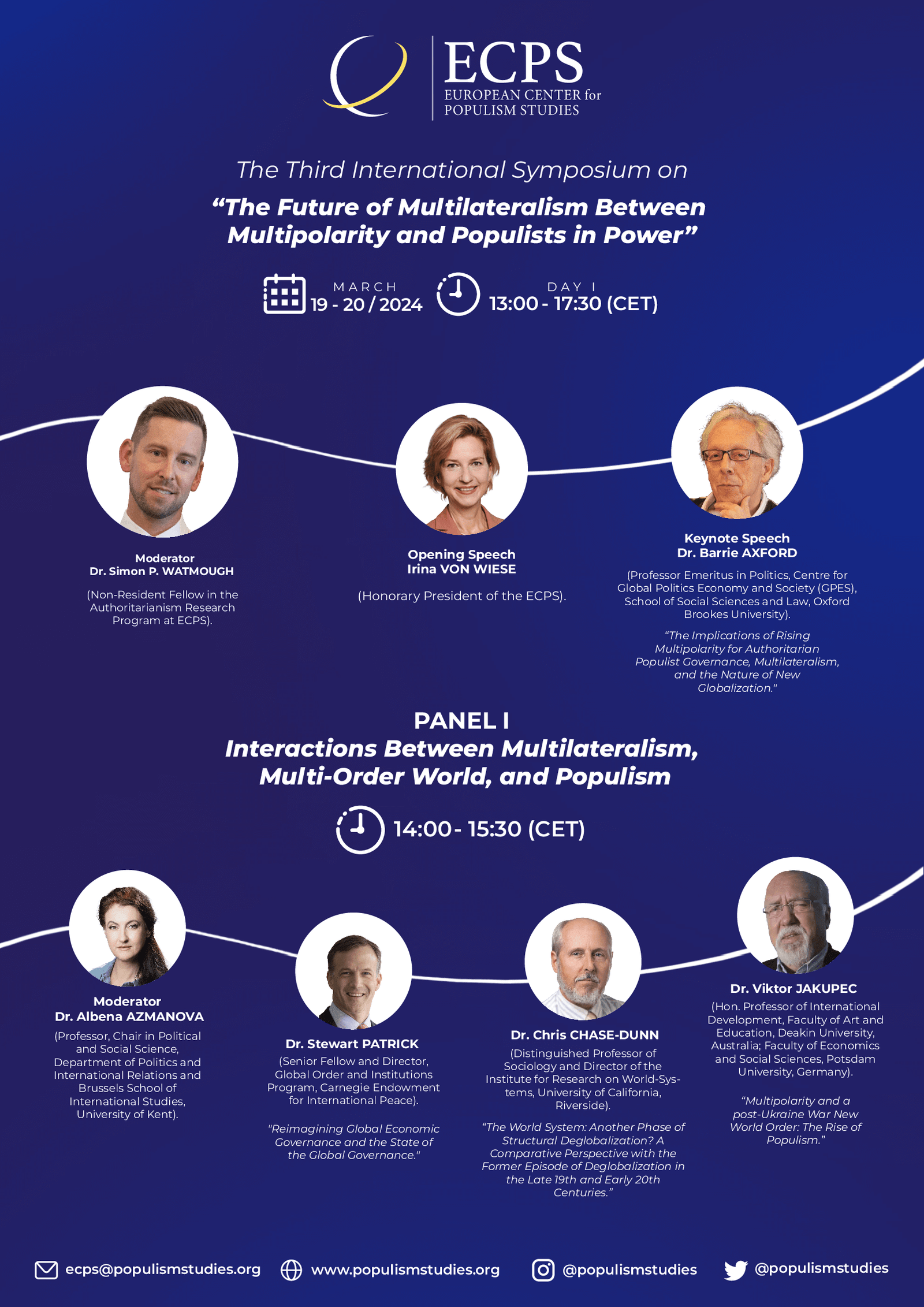
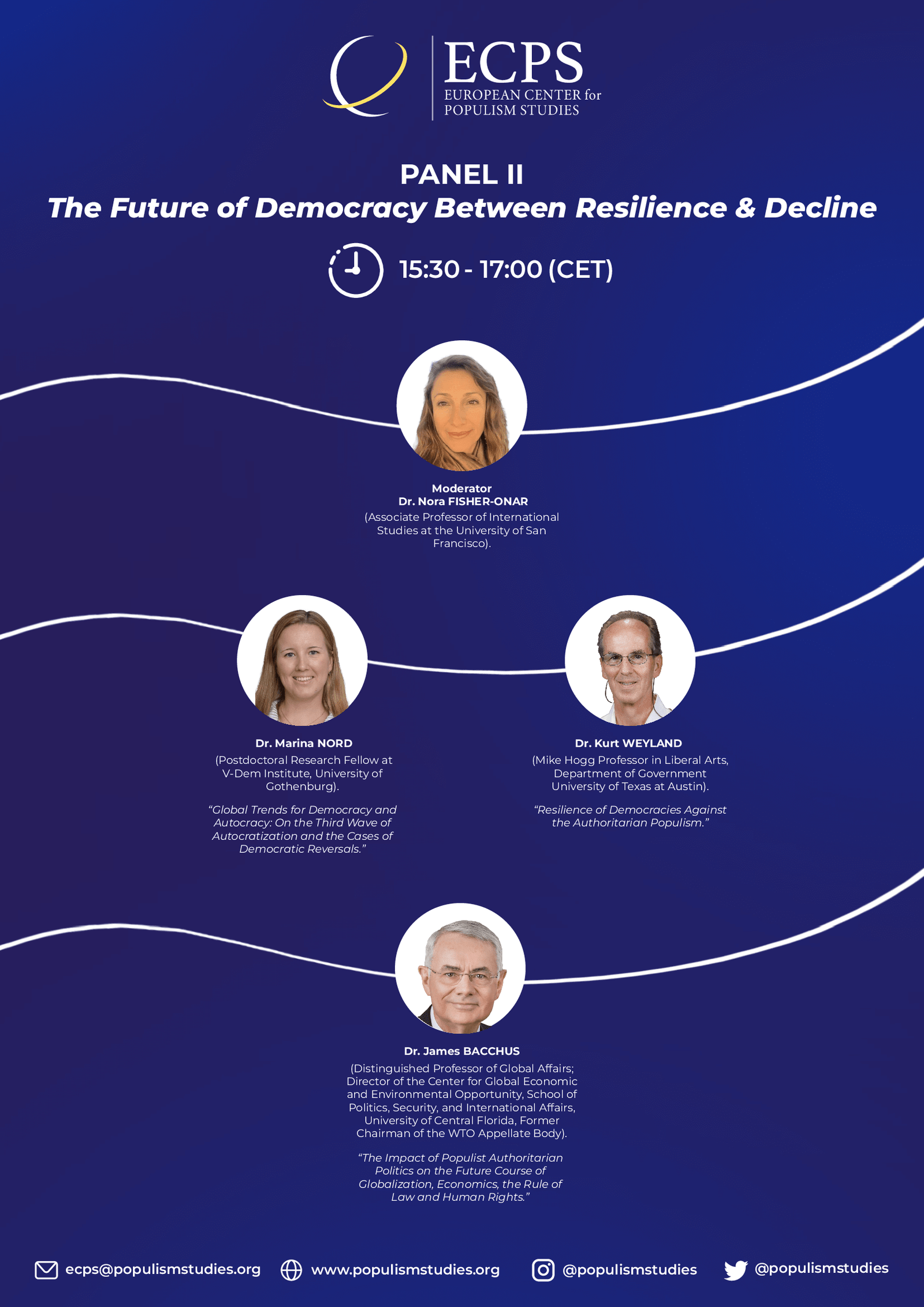
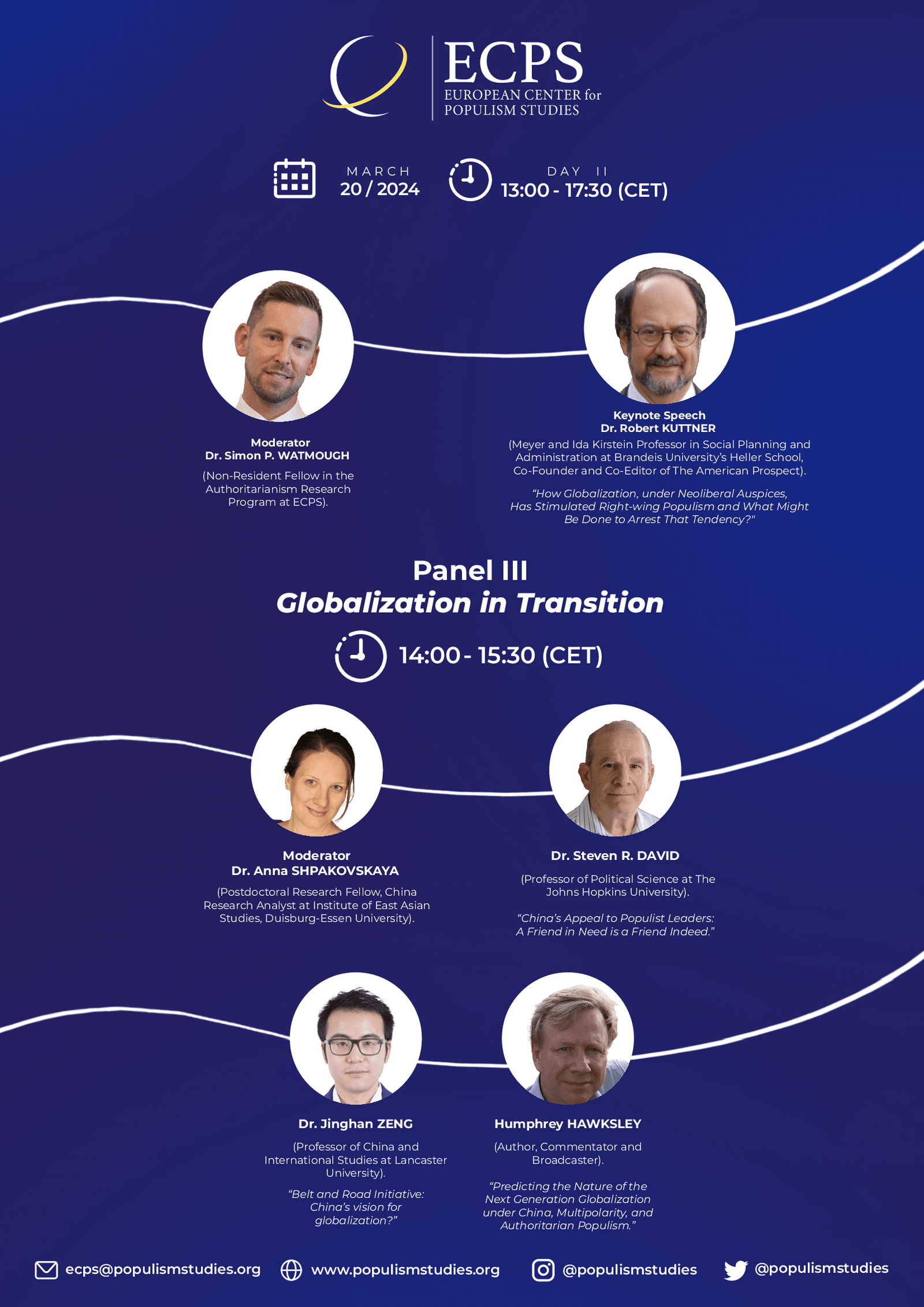
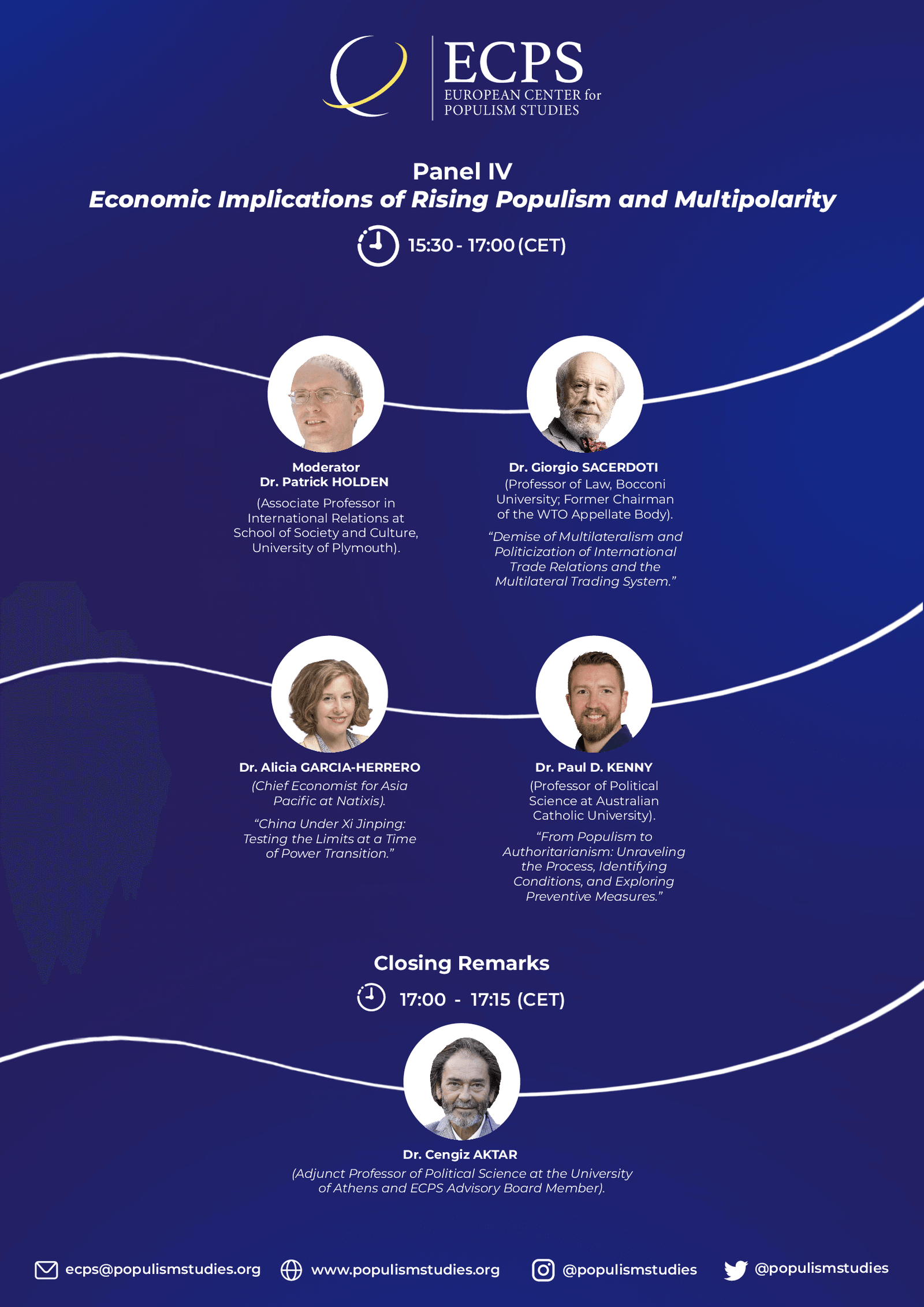
Brief Bios and Abstracts
Opening Speech
Irina von Wiese, Honorary President of ECPS, was born in Germany, the daughter and granddaughter of Polish and Russian refugees. After completing her law studies in Cologne, Geneva and Munich, she obtained a scholarship to study at the Harvard Kennedy School where she gained a Master in Public Administration. Her subsequent legal training took her to Berlin, Brussels and Bangkok, and gave her a first insight into the plight of refugees and civil rights defenders across the globe.
From 1997 to 2019, Irina lived and worked as a lawyer in private and public sector positions in London. During this time, she volunteered for human rights organisations, advising on migration policy and hosting refugees in her home for many years.
In 2019, Irina was elected to represent UK Liberal Democrats in the European Parliament. She served as Vice Chair of the Human Rights Subcommittee and as a member of the cross-party Working Group on Responsible Business Conduct. The Group’s main achievement was the introduction of EU legislation to make human rights due diligence mandatory in global supply chains. During her term, she was also elected to the Executive Committee of the European Endowment for Democracy, whose task is to support grassroots civil society initiatives in fragile democracies.
Having lost her seat in the European Parliament after the UK’s withdrawal from the European Union, Irina returned to the UK, where she was elected to the Council of Southwark, one of London’s most diverse boroughs. Her links to Brussels are maintained through an advisory role at FGS Global, where she works on EU law and ESG issues. In addition, Irina is an Affiliate Professor at European business school, the ESCP, teaching international law and politics (including a course entitled ‘Liberalism and Populism’).
Irina is the proud mother of a teenage daughter.
Keynote Speech
Moderator Simon P. Watmough is a postdoctoral researcher at the University of Leipzig in Germany and a non-resident research fellow in the research program on authoritarianism at ECPS. He was awarded his Ph.D. from the European University Institute in April 2017 with a dissertation titled “Democracy in the Shadow of the Deep State: Guardian Hybrid Regimes in Turkey and Thailand.” Dr. Watmough’s research interests sit at the intersection of global and comparative politics and include varieties of post-authoritarian states, the political sociology of the state, the role of the military in regime change, and the foreign policy of post-authoritarian states in the Middle East and Southeast Asia.
His work has been published in Politics, Religion & Ideology, Urban Studies and Turkish Review. Since 2005, Dr. Watmough has taught international relations, diplomacy, foreign policy, and security studies, as well as Middle Eastern history at universities in Australia and Europe. In 2010–11 he was a research fellow at the Centre for Analysis of Social Exclusion (CASE) at the London School of Economics. He has held Visiting Scholar positions at Boğaziçi University in Istanbul (2012), the University of Queensland (2013), Chulalongkorn University in Bangkok, Thailand (2014) and the University of Graz (2017). In addition to his academic publications, he is also a regular contributor to The Conversation and other media outlets.
The Implications of Rising Multipolarity for Authoritarian Populist Governance, Multilateralism, and the Nature of New Globalization
Dr. Barrie Axford is professor emeritus in political science at Oxford Brookes University (UK), where he was founding Director of the Centre for Global Politics, Economy and Society (GPES) and Head of the Department of International Relations, Politics and Sociology (IRPOSO). He has been Visiting Professor/Fellow/Academic at the Universities of Genoa, California (Santa Barbara), Warwick and the Middle Eastern Technical University (METU), Ankara. He serves on the International Editorial Boards of the journals Globalizations and Telematics and Informatics and is Senior Research Associate at the consultancy Oxford XX1. He is Honorary President of the Global Studies Association (UK and Europe). His books include The Global System: Economics , Politics and Culture; New Media and Politics (with Richard Huggins); Theories of Globalization; The World-Making Power of New Media: Mere Connection? and Populism vs the New Globalization. His work has been translated into ten languages.
Abstract: What is it about the current phase of globalization that feeds and is fed by the populist zeitgeist? In what follows I will tie the discussion of populism to the changing character of globalization, sometimes called the “new” globalization, though that label does less than justice to the overlapping nature of historical globalizations. The “new” globalization is both a description of the de-centered and multi-polar constitution of globality today and a reflex to safeguard against the roils of an ever more connected and turbulent world. It is a reminder that globalization has always been a multidimensional and contradictory process, moving to no single constitutive logic, and historical variable. The new globalization is the context for the current populist surge and, in turn, that surge is testimony to its emergence as a serious political force, perhaps as an embedded global script. In the same context the much-rehearsed failures of multilateralism are set against a burgeoning multipolarity which are themselves expressions of the changing face of political modernity.
Panel I: Interactions Between Multilateralism, Multi-Order World, and Populism
Moderator Dr. Albena Azmanova is Professor of Political and Social Science at the University of Kent and Honorary Fellow at the
Institute for Global Sustainable Development, University of Warwick, and Senior Fellow at OSUN Economic Democracy Initiative, Bard College. In her latest book,
Capitalism on Edge (Columbia University Press, 2020) she identifies ubiquitous precarity as the overarching social harm of our times that is at the root of the far-right insurgencies. The book has received numerous awards, among which is the
Michael Harrington Award, with which the American Political Science Association “recognizes an outstanding book that demonstrates how scholarship can be used in the struggle for a better world.” Professor Azmanova has held academic positions at the New School for Social Research in New York, Sciences Po. Paris, Harvard University, the University of California Berkeley and the University of Kent’s Brussels School of International Studies. Her writing is animated by her political activism. She participated in the dissident movements that brought down the communist regime in her native Bulgaria in 1987-1990. She has worked as a policy advisor for a number of international organisations, most recently, as a member of the Independent Commission for Sustainable Equality to the European Parliament and as consultant to the European Parliament’s Committee on Civil Liberties, Justice and Home Affairs (see Azmanova, A and B. Howard,
Binding the Guardian: On the European Commission’s Failure to Safeguard the Rule of Law [2021]). Professor Azmanova is co-founder and co-Editor in Chief of
Emancipations: a Journal of Critical Social Analysis.
Reimagining Global Economic Governance and the State of the Global Governance
Dr. Stewart Patrick is senior fellow and director of the Global Order and Institutions Program at the Carnegie Endowment for International Peace. His primary areas of research focus are the shifting foundations of world order, the future of American internationalism, and the requirements for effective multilateral cooperation on transnational challenges. He is particularly interested in the international governance dilemmas posed by emerging technologies, the planetary ecological crisis, and growing competition in the global commons, including the oceans and outer space.
An expert in the history and practice of multilateralism, Patrick is the author of three books, including The Sovereignty Wars: Reconciling America with the World; Weak Links: Fragile States, Global Threats, and International Security; and The Best Laid Plans: The Origins of American Multilateralism and the Dawn of the Cold War. He has written hundreds of articles, essays, chapters, and reports on problems of world order, U.S. global engagement, the United Nations and other international organizations, and the management of global issues.
A member of the Council on Foreign Relations, Patrick has served on the policy planning staff at the U.S. Department of State. He helped establish the Council of Councils, a global think tank network, and served on the steering committee of the Paris Peace Forum. He appears regularly as an expert commentator in major media, including television, radio, print, an online.
Abstract: Although world leaders and commentators frequently cite the importance and bemoan the decline of the “rules-based international order,” they seldom specify the rules of conduct they are speaking about, much less who should determine their content. In addition, they rarely identify where global attitudes on rules overlap and diverge or clarify the implications for solving practical problems. This is deeply problematic, since normative contestation—including between East and West, and North and South—is a major driving force behind the crises of multilateralism, global economic fragmentation, and surging populism worldwide.
While the crisis of the rules-based order complicates international cooperation in multiple domains, it is particularly noteworthy in the field of global economic governance. Around the world, states and publics are increasingly turning their back on hyper-globalization but have not yet agreed on a post-neoliberal narrative for the world economy. Many are torn by contradictory impulses: a determination to pull back from, and gain some control over globalization to better advance their domestically defined preferences and reassert domestic sovereignty; and a desire to update existing or create entirely new multilateral frameworks to be more globally representative, better address development needs, and address new cross-border challenges from climate change to pandemic disease to financial instability, including through the provision of global public goods.
Constructing a more equitable, inclusive, resilient, and sustainable world economy will require balancing the domestic and global sides of this equation—no small task in a turbulent era racked by populist politics, geopolitical rivalry, stalled development, lackluster growth, yawning inequality, technological disruption, and a planetary-scale ecological emergency.
Multipolarity and a Post-Ukraine War New World Order: The Rise of Populism
Dr. Viktor Jakupec is Hon. Prof. of International Development, Faculty of Arts and Education, Deakin University, Australia and Faculty of Economics and Social Sciences, Potsdam University, Germany. Throughout his academic career, he was affiliated with several universities in Australia, and as a consultant with international development agencies in MENA, Asian, Balkan, and the Asia-Pacific countries. His most recent publications are “Dynamics of the Ukraine War: Diplomatic Challenges and Geopolitical Uncertainties” (Springer 2024) and “Foreign Aid in a World in Crisis: Shifting Geopolitics in the Neoliberal Era” (co-authored with Max Kelly and John McKay, Routledge 2024). He holds a Dr. phil. From FU Hagen and Dr. phil. habil. from Giessen University.
Abstract: This presentation explores the increased shifts away from liberal democratic governance towards multipolar populism. It is argued that people in the Global North are losing faith in liberal and neo-liberal governments and political parties. The voters in the Global North are increasingly turning to national populism and governments in the Global South perceive the geo-political and geo-economic global problems caused by the West.
Turning to the current most prevalent geo-political and geo-economic crisis, namely the Russo-Ukraine war as a catalyst for the shift towards populism, it is argued that much is going wrong for the Western Alliances. This includes the emergence of multipolar alliances in opposition to the USA-led alliances, such as BRICS Plus. Against this background, the discussion turns to the nexus of multipolarity and populism. Concurrently, the surge of populism, driven by diverse socio-political factors, has reshaped both domestic politics and multipolarity. Examining the convergence of these forces unveils the complexities in navigating a post-Ukraine War New World Order, presenting both challenges and opportunities for the global community.
Panel II: The Future of Democracy Between Resilience & Decline
Moderator Nora Fisher-Onar is Associate Professor of International Studies at the University of San Francisco and academic coordintor of Middle East Studies. Her research interests include the theory and practice of international relations, comparative politics (Middle East, Europe, Eurasia), foreign policy analysis, political ideologies, gender and history/memory. She is author of Contesting Pluralism(s): Islamism, Liberalism and Nationalism in Turkey (Cambridge University Press, in-press) and lead editor of Istanbul: Living with Difference in a Global City (Rutgers University Press, 2018 with Susan Pearce and E. Fuat Keyman). She has published extensively in scholarly journals like the Journal of Common Market Studies (JCMS), Conflict and Cooperation, Millennium, Theory and Society, Qualitative and Multi-Method Research, Women’s Studies International Forum, and Middle East Studies. Fisher-Onar also contributes policy commentary to fora like Foreign Affairs, the Guardian, OpenDemocracy, and the Washington Post (Monkey Cage blog), as well as for bodies like Brookings, Carnegie, and the German Marshall Fund (GMF). At the GMF, she has served as a Ronald Asmus Fellow, Transatlantic Academy Fellow, and Non-Residential Fellow.
Global Trends for Democracy and Autocracy: On the Third Wave of Autocratization and the Cases of Democratic Reversals
Dr. Marina Nord is a Postdoctoral Research Fellow at the V-Dem Institute and one of the authors of the Democracy Reports published by the V-Dem Institute. Her research interests cover a broad range of areas pertaining to autocratization / democratic backsliding and democratization processes, with special focus on economic sources of regime (in)stability. She holds a PhD in Political Economy (Hertie School, Berlin), has worked on a number of research projects related to democratic backsliding and economic governance, and is passionate about bridging the gap between academic research and policy domains.
Abstract: This talk will discuss the latest trends for democracy and autocracy in the world and across regions based on the most recent Democracy Report from the V-Dem Institute. Among other things, the speaker will show that 42 countries of the world are now affected by the ongoing wave of autocratization; the level of democracy enjoyed by the average global citizen is down to 1985-levels; less than 30% of people worldwide are now governed democratically; and that autocratization often continues after democratic breakdowns taking countries further into more harsh dictatorships. Rising polarization and disinformation, growing threats on freedom of expression and civil liberties, coupled with shifting balance of economic power make for a worrying picture. At the same time, the speaker will show that historically, almost half of all episodes of autocratization have been eventually turned around. The estimate increases to 70% when focusing on the last 30 years. The vast majority of successful cases of re- democratization eventually lead to restored or even improved levels of democracy. The speaker will also present some important elements uniting the most recent cases of democratic resilience and discuss how they could be critical in stopping and reversing contemporary autocratization.
Resilience of Democracies Against the Authoritarian Populism
Dr. Kurt Weyland is Mike Hogg Professor in Liberal Arts, Department of Government, University of Texas at Austin since September 2014. Professor Weyland’s research interests focus on democratization and authoritarian rule, on social policy and policy diffusion, and on populism in Latin America and Europe. He has drawn on a range of theoretical and methodological approaches, including insights from cognitive psychology, and has done extensive field research in Argentina, Bolivia, Brazil, Chile, Costa Rica, Peru, and Venezuela. After receiving a Staatsexamen from Johannes-Gutenberg Universitat Mainz in 1984, a M.A. from UT in 1986, and a Ph.D. from Stanford University in 1991, he taught for ten years at Vanderbilt University and joined UT in 2001. He has received research support from the SSRC and NEH and was a fellow at the Woodrow Wilson Center in Washington, DC, in 1999/2000 and at the Kellogg Institute, University of Notre Dame, in 2004/05. From 2001 to 2004, he served as Associate Editor of theLatin American Research Review. He is the author of Democracy without Equity: Failures of Reform in Brazil (University of Pittsburgh Press, 1996), The Politics of Market Reform in Fragile Democracies: Argentina, Brazil, Peru, and Venezuela (Princeton University Press, 2002), Bounded Rationality and Policy Diffusion: Social Sector Reform in Latin America (Princeton University Press, 2007), several book chapters, and many articles in journals such as World Politics, Comparative Politics, Comparative Political Studies, Latin American Research Review, International Studies Quarterly, Journal of Democracy, Foreign Affairs, and Political Research Quarterly. He has also (co-edited two volumes, namely Learning from Foreign Models in Latin American Policy Reform (Woodrow Wilson Center Press, 2004) and, together with Wendy Hunter and Raul Madrid, Leftist Governments in Latin America: Successes and Shortcomings(Cambridge University Press, 2010). His latest book, Making Waves: Democratic Contention in Europe and Latin America since the Revolutions of 1848, was published by Cambridge University Press in 2014.
Abstract: After Trump’s election, many observers depicted populism as a grave threat to democracy. Yet my systematic comparative analysis of thirty populist chief executives in Latin America and Europe over the last four decades shows that democracy usually proves resilient. With their power hunger, populist leaders manage to destroy democracy only under special restrictive conditions, when distinct institutional weaknesses and exceptional conjunctural opportunities coincide. Specifically, left-wing populists can suffocate democracy only when benefitting from huge revenue windfalls, whereas right-wing populists must perform the heroic feat of resolving acute, severe crises. Because many populist chief executives do not face these propitious conditions, they fail to suffocate democracy; indeed, their haphazard governance often leads to their own premature eviction or electoral defeat. Given their institutional strength and their immunity to crises and windfalls, the advanced industrialized countries can withstand populism’s threat; even a second Trump administration is exceedingly unlikely to asphyxiate democracy.
The Impact of Populist Authoritarian Politics on the Future Course of Globalization, Economics, the Rule of Law and Human Rights
Dr. James Bacchus is the Distinguished University Professor of Global Affairs and Director of the Center for Global Economic and Environmental Opportunity at the University of Central Florida (GEEO). He was a founding judge and was twice the Chairman – the chief judge – of the highest court of world trade, the Appellate Body of the World Trade Organization.
Professor Bacchus is a former Member of the Congress of the United States, from Florida, and a former international trade negotiator for the United States. He served on the High-Level Advisory Panel to the Conference of Parties of the United Nations Framework Convention on Climate Change during the negotiation of the Paris climate agreement and is on the Leadership Council of the United States chapter of the United Nations Sustainable Development Solutions Network. He has chaired the global Commission on Trade and Investment Policy of the International Chamber of Commerce and the global council on sustainability governance of the World Economic Forum.
Professor Bacchus is a Visiting Fellow at the Lauterpacht Centre for International Law and at Wolfson College and a member of the Advisory Council at Cambridge Governance Labs of the University of Cambridge in the United Kingdom. For more than fourteen years, he chaired the global practice of the largest law firm in the United States and one of the largest in the world, Greenberg Traurig.
Professor Bacchus is the author of five well-received books and is currently writing a new book on the relationship between democracy and sustainable development.
Abstract: Populists, as most commentators acknowledge, come to power on the back of relatively free and fair elections. Yet once in office, populists appear to have a deeply ambiguous, if not hostile, relationship with democracy. Some scholars have argued that populism is inherently illiberal, or even authoritarian. Others have defined populism as a kind of half-way house between democracy and dictatorship. At best, however, this approach simply labels rather than explains the problem. When, why, and how do populists become dictators? In fact, the transition from populist rule to full personalist dictatorship is relatively rare. Drawing from my ongoing research on the long-run implications of populist rule, this talk will examine how populists make the transition to dictatorship, and discuss the conditions that make this more likely.
Keynote Speech
Moderator Simon P. Watmough is a postdoctoral researcher at the University of Leipzig in Germany and a non-resident research fellow in the research program on authoritarianism at ECPS. He was awarded his Ph.D. from the European University Institute in April 2017 with a dissertation titled “Democracy in the Shadow of the Deep State: Guardian Hybrid Regimes in Turkey and Thailand.” Dr. Watmough’s research interests sit at the intersection of global and comparative politics and include varieties of post-authoritarian states, the political sociology of the state, the role of the military in regime change, and the foreign policy of post-authoritarian states in the Middle East and Southeast Asia.
His work has been published in Politics, Religion & Ideology, Urban Studies and Turkish Review. Since 2005, Dr. Watmough has taught international relations, diplomacy, foreign policy, and security studies, as well as Middle Eastern history at universities in Australia and Europe. In 2010–11 he was a research fellow at the Centre for Analysis of Social Exclusion (CASE) at the London School of Economics. He has held Visiting Scholar positions at Boğaziçi University in Istanbul (2012), the University of Queensland (2013), Chulalongkorn University in Bangkok, Thailand (2014) and the University of Graz (2017). In addition to his academic publications, he is also a regular contributor to The Conversation and other media outlets.
How Globalization, under Neoliberal Auspices, Has Stimulated Right-wing Populism and What Might Be Done to Arrest That Tendency?
Robert Kuttner is co-founder and co-editor of The American Prospect magazine and Meyer and Ida Kirstein Professor at Brandeis University’s Heller School. He was a longtime columnist for Business Week, the Boston Globe, and the Washington Postsyndicate. He was a co-founder of the Economic Policy Institute and serves on its board and executive committee.
Kuttner is author of thirteen books, most recently his 2022 book,
Going Big: FDR’s Legacy, Biden’s New Deal, and the Struggle to Save Democracy.
His other books include Can Democracy Survive Global Capitalism?(2018) and the 2008 New York Times bestseller, Obama’s Challenge: American’s Economic Crisis and the Power of a Transformative Presidency. His best-known earlier book is Everything for Sale: the Virtues and Limits of Markets (1997), which received a page one review in the New York Times Book Review.
His magazine and journal writing, covering the interplay of economics and politics, has appeared in
The Atlantic, Harpers, The New Republic, New York Review of Books, The New Yorker, The New York Times Magazine and
Book Review, New York Magazine, Mother Jones, Foreign Affairs, New Statesman, Political Science Quarterly, Columbia Journalism Review, Harvard Business Review, and
Challenge.
Kuttner has contributed major articles to The New England Journal of Medicine as a national policy correspondent. His previous positions have included national staff writer on The Washington Post, chief investigator of the U.S. Senate Banking Committee, executive director of the National Commission on Neighborhoods, and economics editor of The New Republic.
He is the winner of the Sidney Hillman Journalism Award (twice), the John Hancock Award for Financial Writing, the Jack London Award for Labor Writing, and the Paul Hoffman Award of the United Nations for his lifetime work on economic efficiency and social justice. He has been a Guggenheim Fellow, Woodrow Wilson Fellow, Demos Fellow, Radcliffe Public Policy Fellow, German Marshall Fund Fellow, Wayne Morse Fellow and John F. Kennedy Fellow.
Robert Kuttner was educated at Oberlin College, The London School of Economics, and the University of California at Berkeley. He holds honorary doctorates from Oberlin and Swarthmore. He has also taught at Boston University, the University of Oregon, University of Massachusetts, and Harvard’s Institute of Politics. He lives in Boston with his wife, Northeastern University Professor Joan Fitzgerald.
Abstract: What is Populism? The US origins of the term, in the late 19th century. The original populist movement of the 1880s and 1890s had both a progressive economic dinension, as a farmers’ and workers’ protest against econmic concentration, and a white- racist and anti-immigrant dimension. Both elements were present in the People’s Party, which nearly displaced the Democratic Party in 1896 as one of the two major American political parties. The Democratic Party adopted some of the People’s Party’s program and candidates.
Progressive populism, as a popular revolt against extremes of wealth and poverty and corporate abuses, reached its zenith in the US during President Franklin Roosevelt’s New Deal. At the same time, elements of continuing racism in the US reflected reactionary populism.
In Europe, fascism gained ground in the 1920s and 1930s, to a substantial degree because of the failure of European leaders to pursue a post-WWI recovery program and the infliction of austerity economics not just on defeated Germany but on the continent generally. (See J.M. Keynes, Economic Consequences of the Peace (1919), and Karl Polanyi, The Great Transformation (1944.) The fascist intellectuals of that era, such as Mussolini’s theorist, Giovanni Gentile (The Doctrine of Fascism, 1932), contended that the democracies were doomed because they could solve neither economic nor political problemas, nor the question of national identity. Fascism was built on extreme nationalism as well as authoritarianism.
For the most part the term populism was not used in that era to describe European fascism.
The Postwar Political and Economic Settlement in Western Europe and the US. After the defeat of the Axis powers, both the fascist far-right and the economic libertarian right had been discredited and marginalized. The victorious powers were of the view that mass unemployment in the 1920s and 1930s has been a substantial cause of fascism and war. No influential political parties in Europe in the postwar era were promoting laissez-faire, much less extreme nationalism or authoritarianism.
The postwar European recovery program and the dominant set of policies in the US blended managed capitalism and social democracy. Most leaders of that period in Continental Europe were Christian Democrats. In Scandinavia and Britain, they were social democrats. As a way of preventing a future European war, they promoted full employment, a welfare state, regulation of capital, and steps towards European union as a way both of containing Germany within a larger European whole, and reducing nationalism. In that era, which was one of recovery and increasing shared prosperity, there was virtually no neo-fascism–what some today would call populism.
In my view, it is a conceptual and semantic mistake to conflate neo-fascism with populism. The former has a clear meaning and clear historical antecedents. The latter can refer to far-right authoritarian movements, or to reformist, pro-democratic left movements. The view that something called “populism” is an anti-democratic virus to be resisted confuses more than it clarifies.
Neoliberalism and the End of the Postwar System. The economic crisis of the 1970s brought neoliberals back to power, politically and intellectually. Unemployment increased. So did economic inequality. In most of the West, the neoliberal program included tax cuts, deregulation, privatization, and a weakening of trade unions. After 1989, the rules of the EU gave priority to free movement of capital, goods, services and people. After 1995, the new World Trade Organization enforced rules of liberal trade worldwide.
In these circumstances, the incomes of ordinary working people stagnated or fell, while the income and wealth of economic elites soared. Nominally center-left parties, such as the Democratic Party in the US, the Labour Party in the UK, and the German SPD, embraced much of the neoliberal program. This convergence meant there was no mainstream opposition party; the only opposition to the centrist consensus was on the far-right or far-left.
The economic crisis that began in 2008 raised unemployment rates. The neoliberal leadership governing the EU and the ECB demanded austerity policies, which prolonged the crisis. In this context, immigration, which was now open throughout the EU, increased. With the worldwide economic downturn, extra-European migration, both legal and illegal, also increased. The mainstream parties had no good solutions.
The worsening economic situation of ordinary working people was in drastic contrast to that of the postwar era when there was full employment, broadly shared prosperity, little immigration, and no support for the neo-fascist right because the system enjoyed broad popular legitimacy.
The Rise of the Neo-fascist Right. In the years after 2008, far-right parties became the largest or second largest parties in much of Europe. In some nations, they have been part of coalition governments. In Turkey, Poland, Hungary, and in the United States under Donald Trump, the neo-fascist right has governed.
These parties and leaders have in common an authoritarian undermining of democracy, the use of anti-foreign and ultra-nationalist themes, and personalist leadership. They tend to be disproportionately supported by working-class voters, who have been the disproportionate losers of neo-liberal globalization. Oddly, nominally center-left parties, are increasingly supported by the educated and the affliuent on the basis of social issues, while far-right parties increasingly win the working class vote.
Is there a Cure? If neoliberal globalization has undermined the economic security of ordinary citizens, what is the alternative? There is definitely a far-right version of economic nationalism, but there is also a more benign version that relies on national economic planning and tighter regulation of trans-national capital to restore more balanced economic opportunities. This would take us back to something like the tacit social contract of the postwar era. (For a detailed description, see Dani Rodrik, The Globalization Paradox, 2011.)
There is more than one form of multilateralism. The multilateral system built after World War II laid the foundations for a mixed economy of broad prosperity, which in turn innoculated the body politic against neo-fascist tendencies. The successor system, beginning in the 1970s and 1980s, returned the economy to extreme insecurity and inequality, eventually stimulating a neo-fascist backlash.
In the United States, President Joe Biden has begun moving public policy back towards something more like the postwar social compact, with extensive industrial policies to rebuild domestic supply chains and good jobs. These policies do violate some of the rules of the WTO.
Biden has embraced a salutary economic nationalism, but is a strong defender of democracy and is far from a neo-fascist. Biden has also been an ally of a resurgent trade union movement, which uses frankly “populist” rhetoric against rapacious global corporations; but that brand of “populism” seems to be a necessary antidote the appeals of neo-fascism and has nothing in common with it.
Panel III: Globalization in Transition
Moderator Dr. Anna Shpakovskaya is Associate Researcher at the Institute of East Asian Studies at the University of Duisburg-Essen. Born in St. Petersburg, Russia, she spent ten years in Shanghai and the last 14 years in Duisburg. After receiving her PhD in Political Science with Focus on China in 2017, Anna has worked as China Analyst on several international research projects in Germany. She was an Associate Professor at Goethe University in Frankfurt am Main in 2020-2021. Anna also gives regular lectures at Université Paris-Est Créteil in France.
China’s Appeal to Populist Leaders: A Friend in Need is A Friend Indeed
Dr. Steven R. David is a Professor of Political Science and International Relations at The Johns Hopkins University whose work focuses on security studies, the politics of the developing world, American foreign policy, and turmoil in the Middle East. David’s scholarship emphasizes the impact of internal politics on foreign policy, particularly among developing countries. David introduced the theory of “omnibalancing,” which asserted that to understand the foreign policies of developing countries it was necessary not only to consider external threats to the state, but also internal challenges to regime survival.
Abstract: China is aggressively courting populist leaders throughout the world in an effort to spread its influence and rewrite the rules of the Liberal International Order. The theory of omnibalancing does much to explain the tools China employs in this endeavor and explains why it may succeed. Omnibalancing argues that leaders pursue policies to advance their personal interest (and not the national interest) and their most important interest in remaining in power. This is especially the case for populist leaders whose fall from power my also result in imprisonment or death. As such, these leaders will turn to the outside country who is has the will and capacity to keep them in office. Since most of the threats these leaders face are internal, they will align with the state that can best protect them from the domestic threats (coups, revolutions, insurgencies, mass protests, assassinations) they face. China’s toolkit of digital surveillance technologies, indifference to corruption, and sheer economic power makes it increasingly the partner of choice. At the same time, China has significant weaknesses in attracting clients including resentment over exploitative labor practices, undercutting of local businesses, and racism. In order to wean countries away from China’s embrace, the West should not compromise its principles by backing populist leaders, but instead exploit China’s shortcomings while presenting a more attractive model for the citizenry of states under populist rule. Over time, China’s attraction will wane, populist leaders will lose their appeal, and the West will emerge as the patron of choice.
Belt and Road Initiative: China’s Vision for Globalization
Dr. Jinghan Zeng is Professor of China and International Studies at Lancaster University. His current research focuses on China’s AI governance and Belt and Road Initiative. He is the author of several books including Artificial Intelligence with Chinese Characteristics: National Strategy, Security and Authoritarian Governance (2022), Slogan Politics: Understanding Chinese Foreign Policy Concepts (2020) and The Chinese Communist Party’s Capacity to Rule: Ideology, Legitimacy and Party Cohesion (2015). He is also the co-editor of One Belt, One Road, One Story? Towards an EU-China Strategic Narrative (2021).
Professor Zeng has published over thirty refereed articles in leading journals of politics, international relations and area studies including The Pacific Review, International Affairs, JCMS: Journal of Common Market Studies, and Third World Quarterly. He has secured funding from a variety of international sources, including the European Commission, Schmidt Futures (US) and Social Science Foundation of China. Professor Zeng’s research has been covered by the journal Science and major media outlets including Financial Times, The Economist, Forbes and South China Morning Post.
Professor Zeng has testified before the UK Parliament and advised United Nations, Cabinet Office (UK) and Foreign & Commonwealth Office (UK). He regularly appears in TV and radio broadcasts including the BBC, ABC Australia, Al Jazeera, Asharq News, China Global Television Network (CGTN) and Voice of America. He has written op-ed articles for The Diplomat, BBC (Chinese), The Conversation, Nikkei Asia, Policy Forum, Korea on Point among others.
At Lancaster University, Professor Zeng also holds the position of Academic Director of China Engagement and serves as the Director of Lancaster University Confucius Institute. Before embarking on his academic career, he worked for the United Nations’ Department of Economic and Social Affairs in New York City. https://www.lancaster.ac.uk/ppr/people/jinghan-zeng
Abstract: As China’s “Project of the Century,” Belt and Road Initiative represents China’s vision for globalization, Belt and Road Initiative is widely considered as a clearly defined top-down grand strategy of Beijing to build a Sino-centric world order. This presentation will discuss why this view is mistaken. By studying domestic dynamics of Belt and Road Initiative, it will provide an indepth analysis over China’s vision for globalization and the concept of “Belt and Road Initiative.”
Predicting the Nature of the Next Generation Globalization under China, Multipolarity, and Authoritarian Populism
Humphrey Hawksley is an author, commentator and broadcaster, former BBC Beijing Bureau Chief and Asia Correspondent. He is Editorial Director of Asian Affairs and host to the monthly Democracy Forum debates. His latest non-fiction book is ‘Asian Waters: The Struggle over the Indo-Pacific and the Challenge to American Power.’ His current Rake Ozenna thriller series is based in the Arctic which he believes is an unfolding theatre of conflict. His earlier works include the ‘Dragon Strike’ future history series based in the Indo-Pacific, and ‘Democracy Kills: What’s So Good About Having the Vote’ which tied in with his television documentary, ‘Danger: Democracy at Work’ examining wider lessons to be drawn from the Iraq intervention. His television and other documentaries include ‘The Curse of Gold and Bitter Sweet’ examining human rights abuse in global trade; ‘Aid Under Scrutiny’ on the failures of international development. His work has appeared in The Guardian,The Times, The Financial Times, The New York Times and Nikkei Asia, amongst others.
Abstract: Humphrey Hawksley will argue that the Indo-Pacific lies at the cross-roads between what the West categorises as autocracy and democracy. Unlike in North America and Europe, the Indo-Pacific is not united by any one political system or culture. Polarising definitions, therefore are unhelpful. There needs to be change of mindset in the West, an understanding of what drives the vision of a China-influenced Indo-Pacific.
Special Commentator
Dr. Ho Tze Ern Benjamin is Assistant Professor at the China Programme, S. Rajaratnam School of International Studies (RSIS), Singapore. He obtained his PhD from the Department of International Relations at the London School of Economics and Political Science, UK under a RSIS PhD scholarship. He is the author of the book China’s Political Worldview and Chinese Exceptionalism: International Order and Global Leadership (Amsterdam University Press, 2021). He has also published in journals such as China Quarterly, Journal of Contemporary China, East Asia: An International Quarterly, Alternatives: Global, Local, Political, Asia Policy, and the Australian Journal of International Affairs. He was also a Fulbright visiting scholar at the Elliott School of International Affairs, George Washington University between November 2021 and February 2022, and a Taiwan MOFA Fellow between September and December 2022.
Panel IV: Economic Implications of Rising Populism and Multipolarity
Moderator Dr. Patrick Holden is an Associate Professor (Reader) in International Relations at the School of Law, Criminology and Government at Plymouth University. His work explores the link between power, ideas and public policy. His primary research interests focus on the international relations of the European Union, Brexit, International Political Economy and International Development. Recent academic work of his has been published in journals such as The Journal of Common Market Studies, West European Politics, Development Policy Review, Cooperation and Conflict and The Journal of International Relations and Development. His research involves analysing documents and interviewing policy elites and he has done field work in Brussels, Morocco, Egypt and South Africa amongst other places. His current research projects include exploring the future of international development aid and preparing local communities for Brexit. He is on the editorial board of the journal Mediterranean Politics.
Demise of Multilateralism and Politicization of International Trade Relations and the Multilateral Trading System
Dr. Giorgio Sacerdoti is emeritus professor at Bocconi University where he was professor of International Law and European Law (J. Monnet Chair 2004) from 1986 to 2017, focusing on the law of international economic relations, trade and investment, international contracts and arbitration, on which subjects he has published extensively. He was a Member of the WTO Appellate Body from 2001 to 2009 and its chairman in 2006-2007. He is on the ICSID Roster of arbitrators and has served frequently as an arbitrator in commercial and investment disputes under BITS and the ECT.
Abstract: In recent years one of the basic tenets of the multilateral trading system established after WWII by the GATT in 1947, confirmed and reinforced by the WTO in 1995, has been threatened by unilateral actions of several of the main State actors, a sign of mounting geopolitical tensions in a multipolar world. That tenet was the ‘depoliticization’ of trade relations (and, similarly, of investments) in the interest of the development of international trade based on cooperation, non-discrimination, reduction of border barriers, fair competition, and consumers’ benefits, with the ultimate aim to reinforce friendly relations beyond borders.
This liberal approach does not exclude the recognition in the GATT/ WTO system of grounds for unilateral control of trade flows in the interest of economic and non-economic national interests, such as through safeguard measures and recourse to exceptions under Article XX GATT for the protection of non-trade values (morality, human health, environment, exhaustible resources), or in case of international emergencies (Article XXI GATT). Recourse to those actions and countermeasures are, however, in case of abuse subject to impartial rule-based evaluation by the WTO dispute settlement system.
Recently, we have witnessed instead a host of unilateral trade-restrictive measure, both at the micro (enterprise) or at macro (sectoral) levels invoking political commercial and non-commercial (security) reasons, introduction of national industrial policies based on subsidies aiming at protecting national industries well beyond the GATT rules. This has destabilized multi-country supply chains and hampered international economic cooperation. Affected countries have in turn reacted with countermeasures in the form of further restrictions. Basic positive aspects of globalization and multilateralism have been under attack, possibly beyond the intent of the individual actors involved.
An increased attention by States to domestic needs is unavoidable and should not be opposed per se nor labeled protectionism or the poisoned fruit of populism. Attention to protecting employment, ensuring national control of the economy through industrial policies, preserving local manufacturing capability (such as in facing pandemics, a situation that has made this tendency more evident) incapsulates, in any case, the current mood towards deglobalization.
This does not require, however, disregarding existing obligations and commitments, paralyzing global institutions such as the WTO, and brushing away the broader imperative of international cooperation in an interdependent world, lest long-term economic ties, beneficial for all, be seriously disrupted. This is exactly what has happened since 2018 due to policies putting national political objectives first (such as MAGA, workers-centered trade policy, strategic autonomy). This has lead to increased fragmentation of trade relations and supply chains (near- and re-shoring, self-reliance) with dubious benefits to national and global welfare and development.
China Under Xi Jinping: Testing the Limits at a Time of Power Transition
Dr. Alicia García Herrero is the Chief Economist for Asia Pacific at Natixis CIB. She is also an independent Board Member of AGEAS insurance group. Alicia also serves as Senior Fellow at the European think-tank BRUEGEL and as a non-resident Senior Follow at the East Asian Institute (EAI) of the National University Singapore (NUS). Alicia is also Adjunct Professor at the Hong Kong University of Science and Technology (HKUST). Finally, Alicia is and an advisor to the Spanish government on economic affairs, a Member of the Board of the Center for Asia-Pacific Resilience and Innovation (CAPRI), a member of the Advisory Board of the Berlin-based Mercator Institute for China Studies (MERICS), an advisor to the Hong Kong Monetary Authority’s research arm (HKIMR) and a Member of the Council of the Focused Ultrasound Foundation (FUF). Alicia is very active in international media (such as BBC, Bloomberg, CNBC and CNN) as well as social media (LinkedIn and Twitter). As a recognition of her thought leadership, Alicia was included in the TOP Voices in Economy and Finance by LinkedIn in 2017 and #6 Top Social Media leader by Refinitiv in 2020.
Abtsract: For long we have been discussing the increasingly strong strategic competition between the US and China but cracks in both regimes, as well as the rise of India, have pushed the boundaries towards multilateralism. At the same time, growing populism is pushing leaders of middle powers to become more independent instead of relying on the two hegemons. This also means that populism is pushing us away from a cold war towards fragmentation of our economic system. How fragmented trade and investment will become with a multipolar world is still to early to tell.
From Populism to Authoritarianism: Unraveling the Process, Identifying Conditions, and Exploring Preventive Measures
Dr. Paul Kenny is Professor and Director of the Political Science Program at the Institute for Humanities and Social Sciences at Australian Catholic University and a Visiting Fellow at the Australian National University. Dr Kenny is the author of three books, Populism and Patronage: Why Populists Win Elections in India, Asia, and Beyond (Oxford University Press, 2017), which won the American Political Science Association’s 2018 Robert A. Dahl Award, Populism in Southeast Asia (Cambridge University Press, 2019), and most recently, Why Populism? Political Strategy from Ancient Greece to the Present (Cambridge University Press, 2023). He has a PhD in political science from Yale University, and degrees in economics and political economy from the London School of Economics and Trinity College Dublin.
Abstract: Populists, as most commentators acknowledge, come to power on the back of relatively free and fair elections. Yet once in office, populists appear to have a deeply ambiguous, if not hostile, relationship with democracy. Some scholars have argued that populism is inherently illiberal, or even authoritarian. Others have defined populism as a kind of half-way house between democracy and dictatorship. At best, however, this approach simply labels rather than explains the problem. When, why, and how do populists become dictators? In fact, the transition from populist rule to full personalist dictatorship is relatively rare. Drawing from my ongoing research on the long-run implications of populist rule, this talk will examine how populists make the transition to dictatorship, and discuss the conditions that make this more likely.
Closing Remarks
Dr. Cengiz Aktar is an adjunct professor of political science at the University of Athens. He is a former director at the United Nations specializing in asylum policies. He is known to be one of the leading advocates of Turkey’s integration into the EU. He was the Chair of European Studies at Bahçeşehir University-Istanbul.
In 1999, he initiated a civil initiative for Istanbul’s candidacy for the title of European Capital of Culture. Istanbul successfully held the title in 2010. He also headed the initiative called “European Movement 2002” which pressured lawmakers to speed up political reforms necessary to begin the negotiation phase with the EU. In December 2008, he developed the idea of an online apology campaign addressed to Armenians and supported by a number of Turkish intellectuals as well as over 32,000 Turkish citizens.
In addition to EU integration policies, Dr. Aktar’s research focuses on the politics of memory regarding ethnic and religious minorities, the history of political centralism, and international refugee law.


